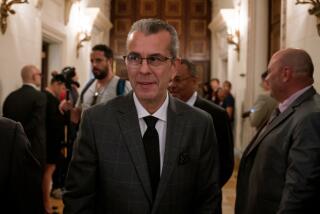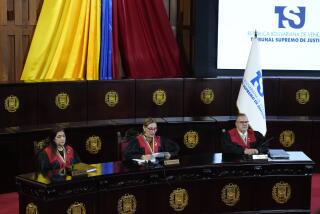Haiti Elections Criticized as Vote-Counting Drags
- Share via
PORT-AU-PRINCE, Haiti — The electoral process here came under intense criticism Monday from friends and opponents of Haitian President Jean-Bertrand Aristide, although few officials seemed ready to call Sunday’s vote a fraud or generally invalid.
U.S. Rep. Porter J. Goss of Florida, who observed the election on behalf of the Republican Party’s International Republican Institute, told reporters that while “the process was seriously wanting,” Sunday “was an important day . . . to prove there was an election.”
Although Goss and the institute are longtime critics of Aristide’s administration and the electoral process here, when asked if the United States should cut or even review its aid program for Haiti, he responded, “No, no, not on the basis of this election.”
Still, the confusion and administrative disarray that marred the voting Sunday continued Monday as undertrained and understaffed electoral officials struggled with a vote count expected to take more than a week to complete.
Although Haitian officials said the tallying was going normally and honestly, there were reports of problems including lost ballots, forgery and destruction of voting boxes.
*
At least one box was found dumped in a culvert in Petionville, a wealthy suburb overlooking Port-au-Prince, and reporters found a downtown electoral office where a strike by vote-counters had left the process in confusion. The scene was chaotic, with ballot boxes sitting unguarded in halls while hundreds of individual ballots were strewn on the floors. Some had blown into the street.
But even critics said it was too early to characterize the counting process as a failure and acknowledged that the reports of abuses were anecdotal and “extremely unscientific.”
Haitian officials and many diplomats discounted the most alarming reports of bedlam and chaos arising from Sunday’s vote, particularly claims that hundreds of thousands of people had been prevented from voting by violence, threats of intimidation or even mismanagement.
Jessi Manigat, the respected deputy president of the Haitian electoral commission, said that “generally speaking, 50% of the voters voted.” The election “was fair” except for scattered areas in the lightly populated north, she said. Other election observers noted that most experts always doubted the turnout would come close to matching the 3.5 million registered voters because the campaign never generated much interest.
“Because the presidency was not at stake, there was no real focus,” said an official of the Organization of American States. “The parties had little money and there was little organized campaigning. In that case, 50% would be a good turnout.”
*
Brian Atwood, director of the U.S. Agency for International Development and head of the official American observer mission, emphasized the largely peaceful nature of the vote. “Yesterday’s elections represent a step in the building of democracy in Haiti,” although “the process was affected by irregularities and administrative flaws that need to be addressed,” he told a news conference.
Colin Granderson, the head of the Organization of American States office here, agreed that there was no sign of serious fraud but said failure to get the vote count under control presents the greatest danger to the integrity of the election. “If the political party members sense serious irregularities, we could see violence. I think the next two days are crucial,” he said in an interview.
Goss agreed. “There was an extraordinary amount of confusion at the end [of Sunday’s voting] and I assume it will go on through the counting today,” he said. Noting what he described as widespread disregard for privacy in voting and security for ballots, he said that “frankly, the Haitian people deserve better.”
Still, Goss acknowledged that “those who wanted to participate,” with some exceptions, voted. “The Haitian people who wanted to vote triumphed.”
Experts here blamed the electoral problems almost exclusively on Anselm Remy, the Aristide-appointed head of the Provisional Electoral Council. “Remy just isn’t capable,” said another diplomat, dismissing the idea that the council president is corrupt.
More to Read
Sign up for Essential California
The most important California stories and recommendations in your inbox every morning.
You may occasionally receive promotional content from the Los Angeles Times.










